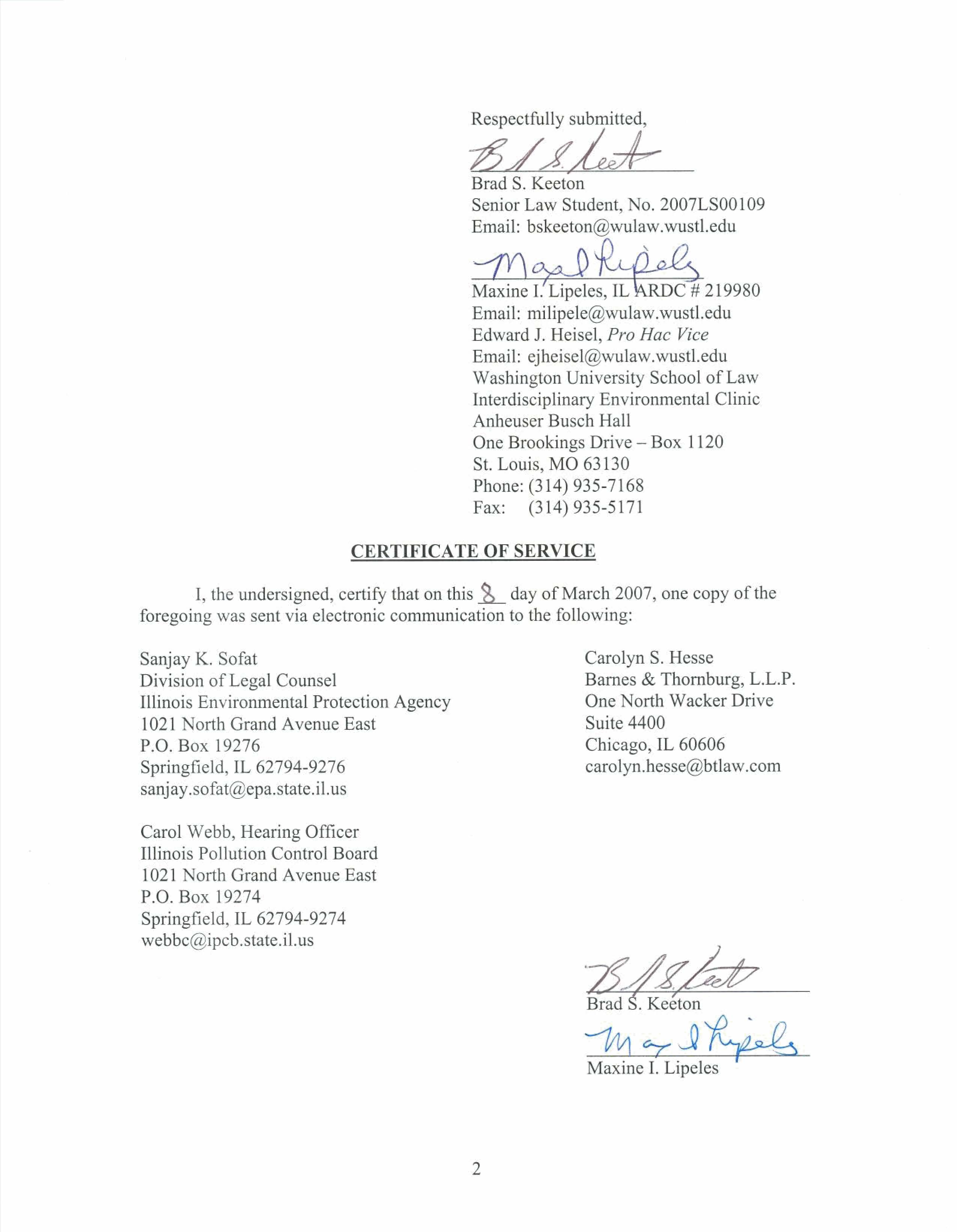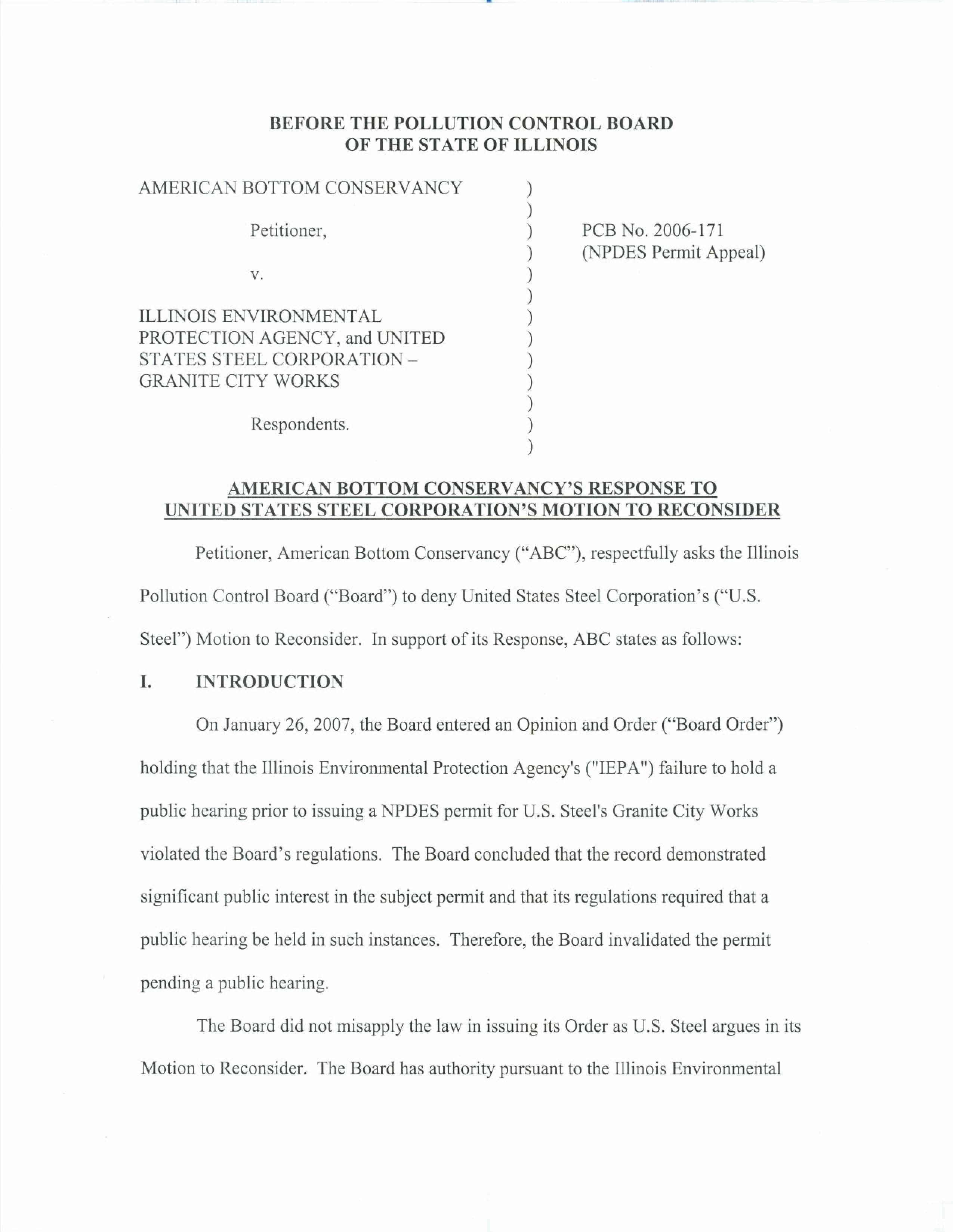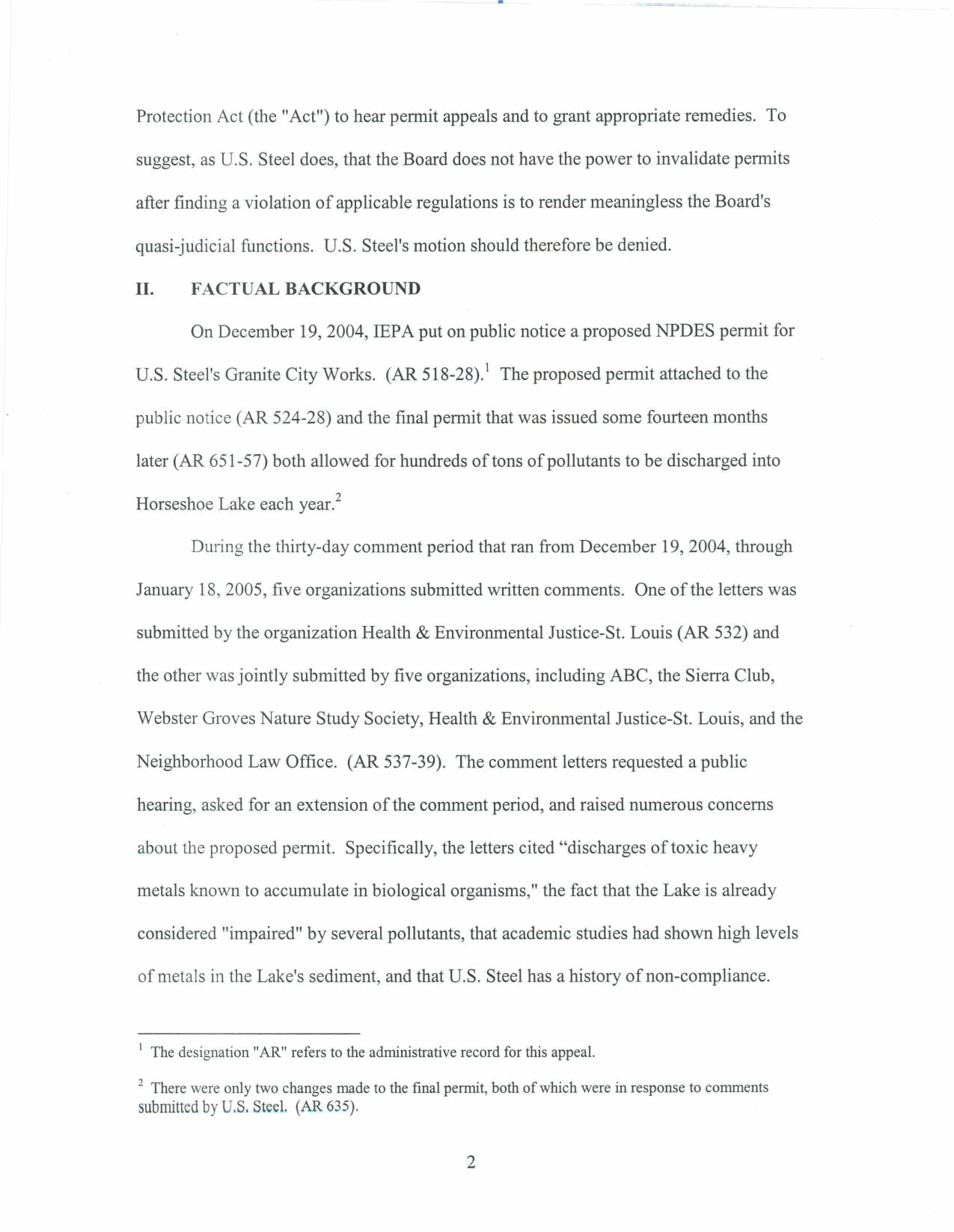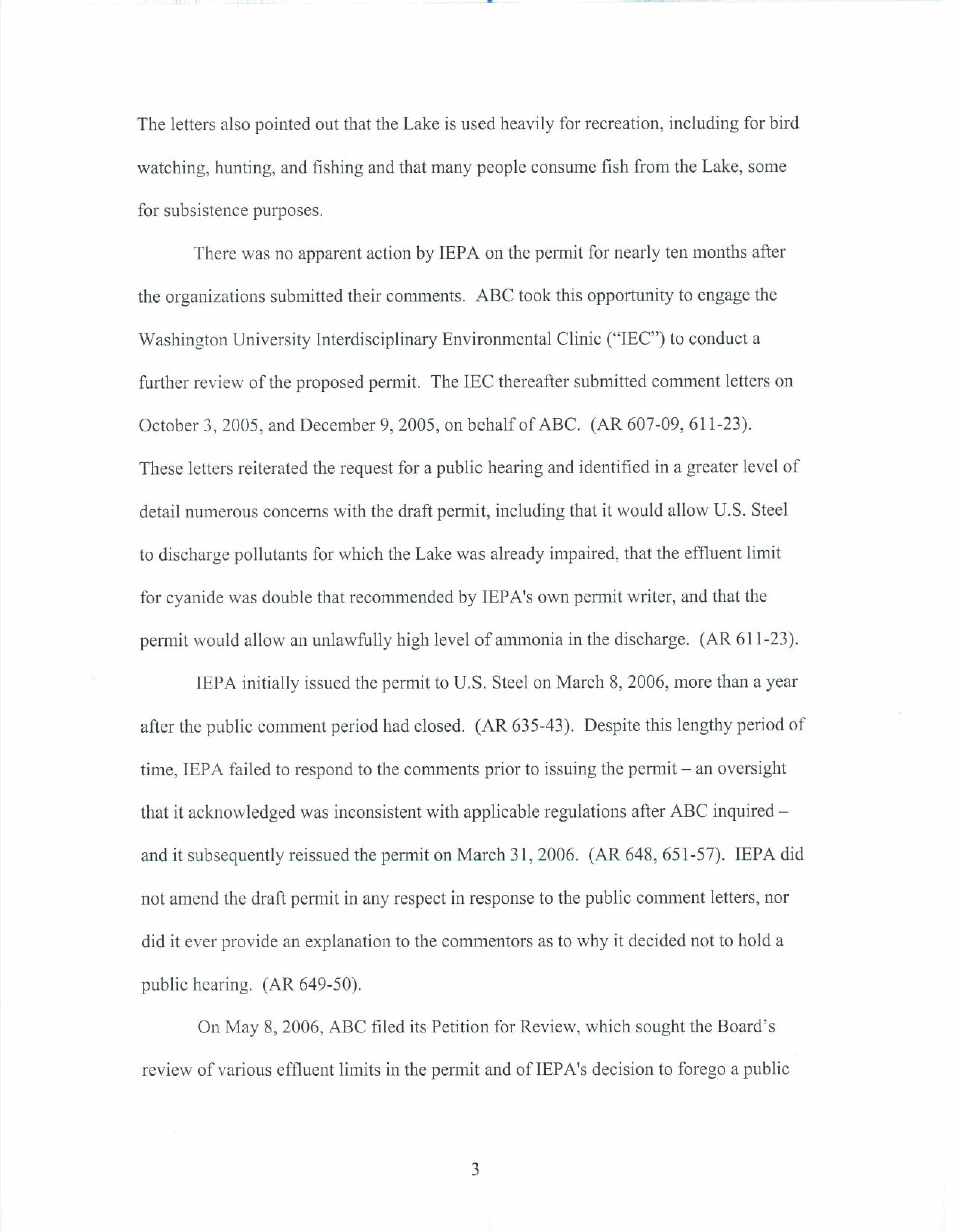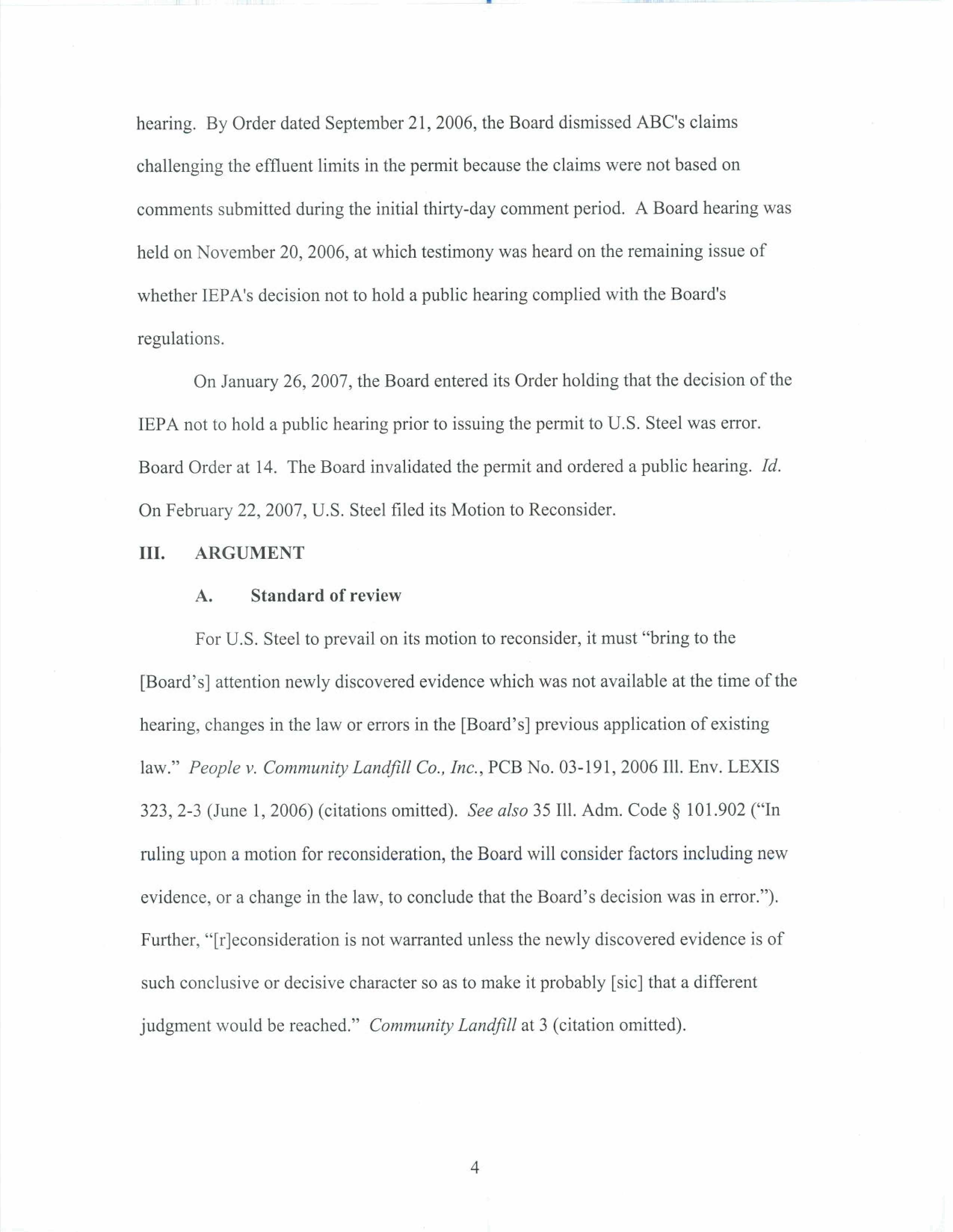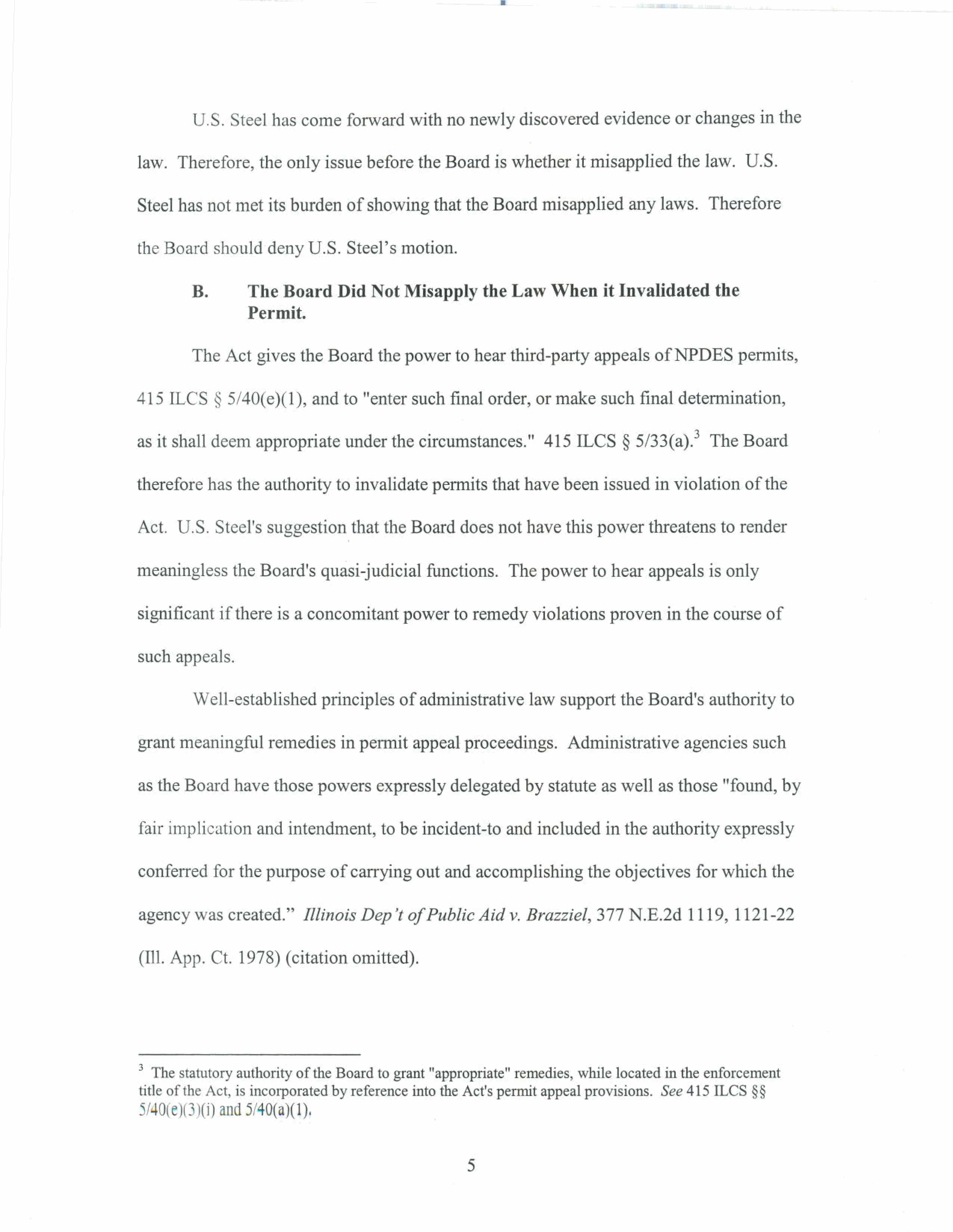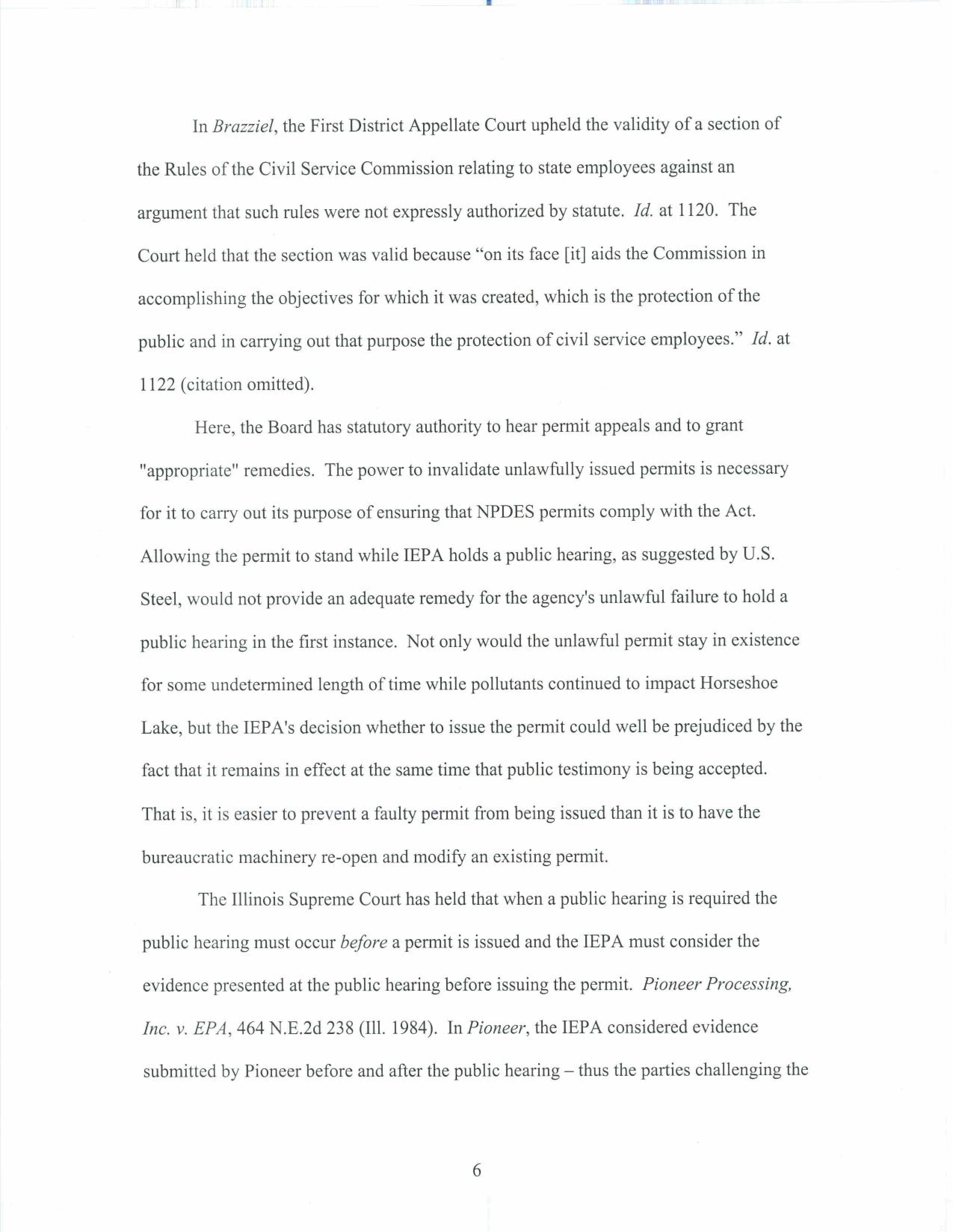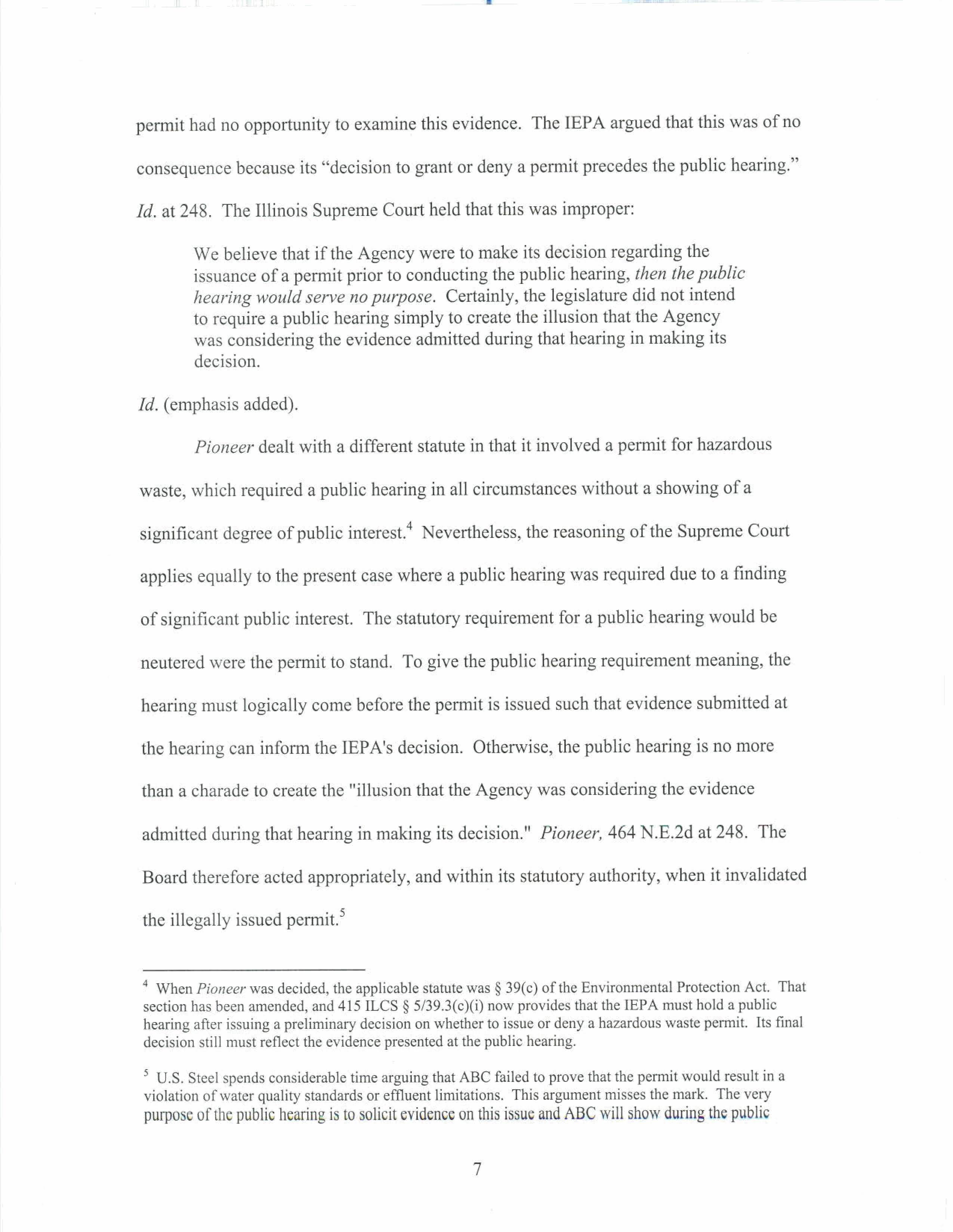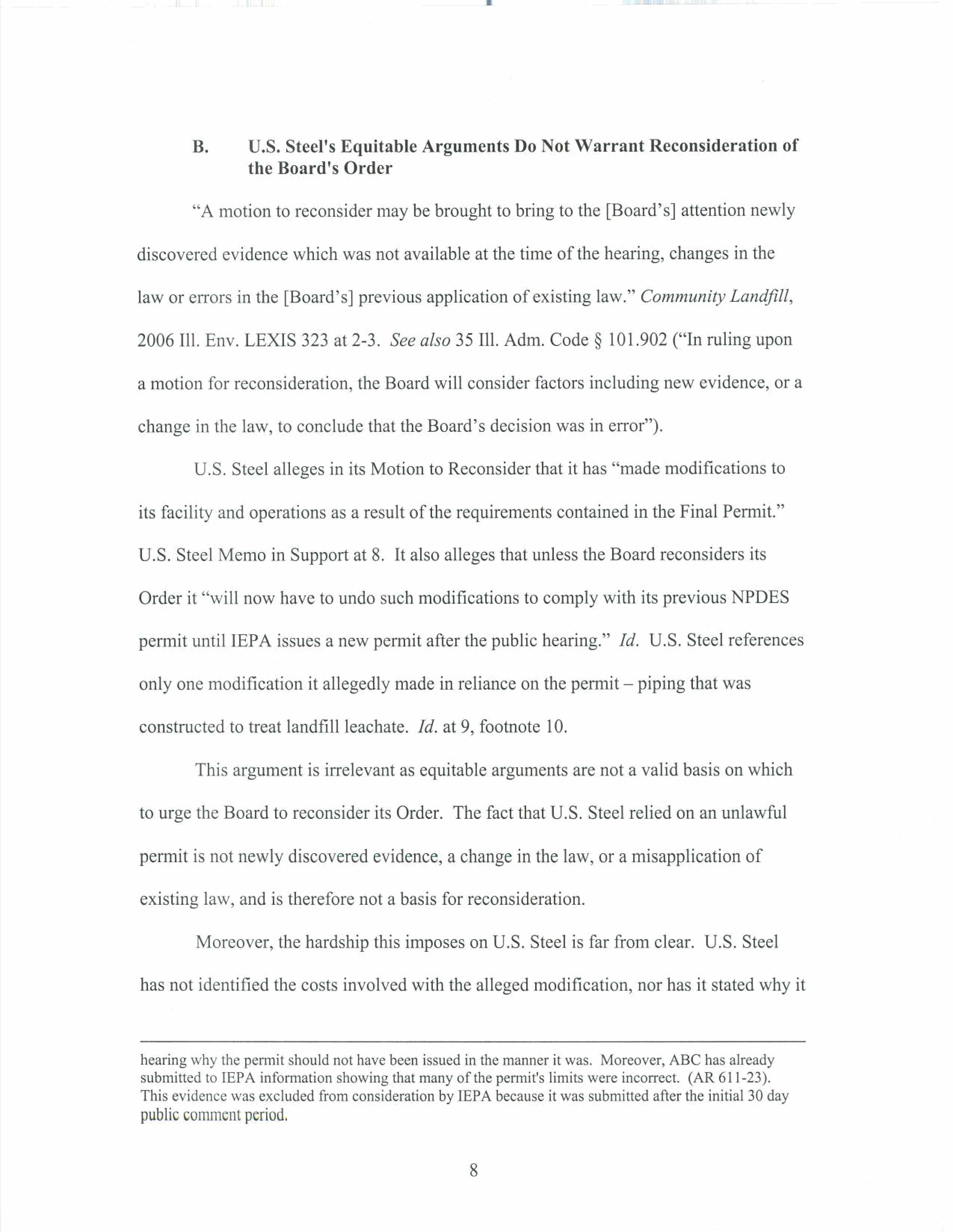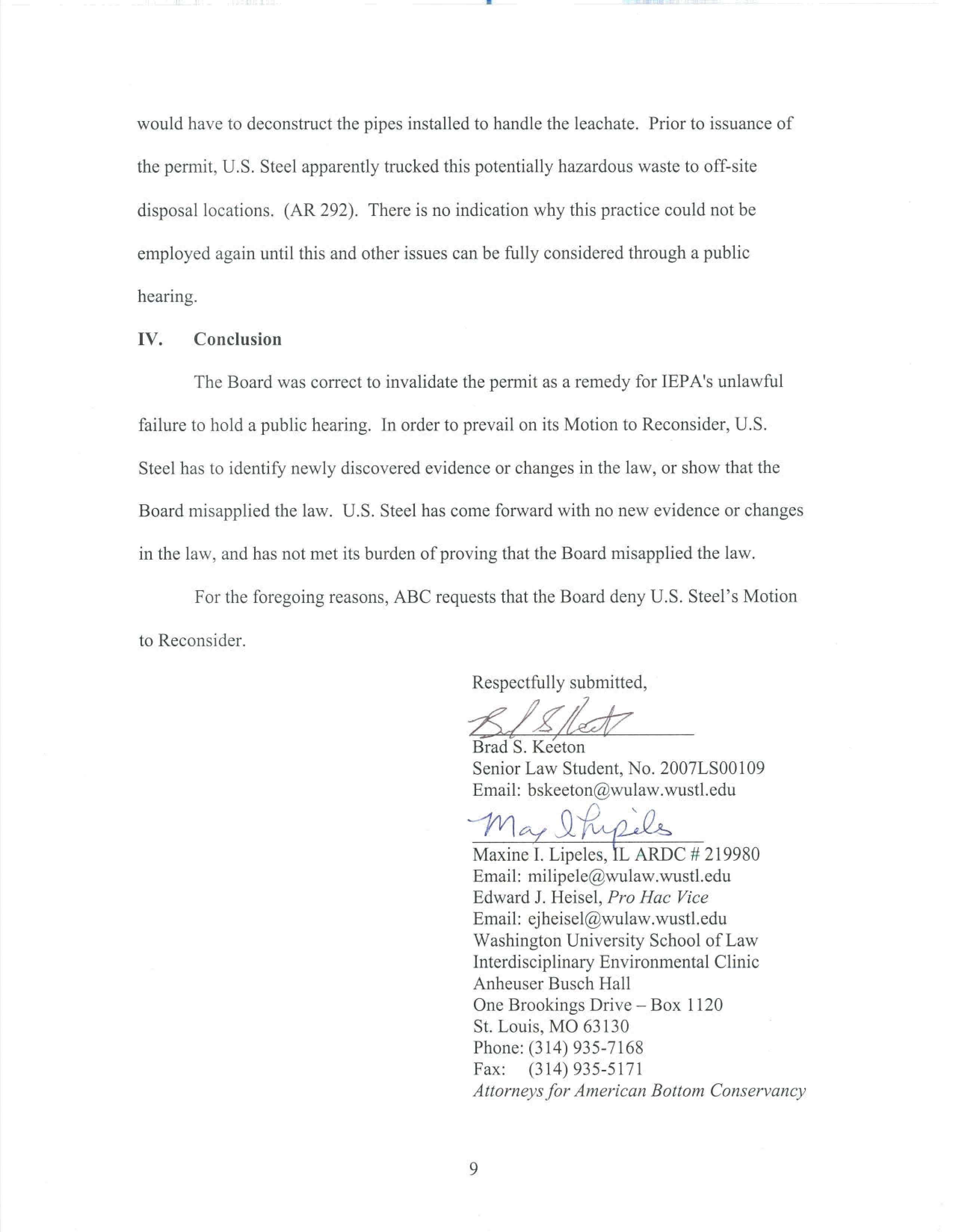BEFORE THE POLLUTION CONTROL BOARD
OF THE STATE OF ILLINOIS
AMERICAN BOTTOM CONSERVANCY
Petitioner,
ILLINOIS ENVIRONMENTAL
PROTECTION AGENCY, and UNITED
STATES STEEL CORPORATION
-
GRANITE CITY WORKS
Respondents.
1
)
PCB NO. 2006- 17 1
(NPDES Permit Appeal)
1
)
1
NOTICE OF FILING
To:
Sanjay K. Sofat
Carolyn S. Hesse
Division of Legal Counsel
Barnes
&
Thornburg, L.L.P.
Illinois Environmental Protection Agency
One North Wacker Drive
102 1 North Grand Avenue East
Suite 4400
P.O. Box 19276
Chicago, IL 60606
Springfield, IL 62794-9276
carolyn.hesse@btlaw.com
sanjay.sofat@epa.state.il.us
Carol Webb, Hearing Officer
Illinois Pollution Control Board
102 1 North Grand Avenue East
P.O. Box 19274
Springfield, IL 62794-9274
webbc@ipcb.state.il.us
PLEASE TAKE NOTICE
that on March
x,
2007, there was filed with the Clerk of
the Illinois Pollution Control Board of the State of Illinois an original, executed copy of
American Bottom Conservancy's Response to United States Steel Corporation's Motion
to Reconsider.
Electronic Filing, Received, Clerk's Office, March 8, 2007
Respectfully submitted,
Brad
S.
Keeton
Senior
Law Student, No. 2007LS00 109
Maxine 1.'1;ipeles, IL
~RDc
#
-
2 199 80
Email:
milipele@wulaw
.wustl.edu
Edward
J. Heisel,
Fro Huc
Vice
Email:
ej
heisel@wulaw.wustl.edu
Washington
University
School of
Law
Interdisciplinary Environmental Clinic
Anheuser
Busch
Hall
One
Brookings Drive
-
Box
1 120
St. Louis,
MO
63 130
Phone:
(314) 935-7168
Fax: (3 14) 935-5 17 1
CERTIFICATE OF SERVICE
I, the undersigned, certify that on
this
day
of March
2007, one copy
of
the
foregoing
was
sent
via
electronic communication
to
the
following:
Sanj
ay
K.
Safat
Division of Legal Counsel
Illinois Environmental Protection
Agency
1021 North Grand Avenue East
P.O.
Box 19276
Springfield,
IL
62794-9276
sanjay.sofat@epa.state.il.us
Carol
Webb,
Hearing Officer
Illinois
Pollution Control
Board
102 1 North Grand Avenue
East
P.O.
Box 19274
Springfield,
IL 62794-9274
webbc@ipcb.state.il.us
Carolyn S. Hesse
Barnes
&
Thornburg,
L.L.P.
One North
Wacker
Drive
Suite
4400
Chicago,
IL
60606
carolyn.
hesse@btlaw.com
-ttl,
Maxine
I.
Lipeles
Electronic Filing, Received, Clerk's Office, March 8, 2007
BEFORE THE POLLUTION CONTROL
BOARD
OF THE STATE OF ILLINOIS
AMERICAN
BOTTOM
CONSERVANCY
Petitioner,
ILLINOIS ENVIRONMENTAL
PROTECTION
AGENCY,
and UNITED
STATES STEEL CORPORATION
-
GRANITE
CITY WORKS
Respondents.
PCB NO. 2006-171
(NPDES
Permit
Appeal)
AMERICAN BOTTOM CONSERVANCY'S
RESPONSE
TO
UNITED STATES STEEL CORPORATION'S MOTION TO RECONSIDER
Petitioner,
American
Bottom Conservancy
("ABC"), respectfully asks
the Illinois
Pollution Control Board ("Board") to deny United
States
Steel Corporation's YU.S.
Steel")
Motion
to
Reconsider.
In
support of its Response, ABC states as follows:
INTRODUCTION
On
January 26,2007, the
Board
entered an
Opinion
and Order
("Board Order")
holding that the Illinois Environmental Protection
Agency's
("IEPA") failure to hold a
public hearing prior to issuing a NPDES
permit
for U.S. Steel's Granite City Works
violated the
Board's
regulations. The Board concluded that the record demonstrated
significant public interest in the subject
permit
and
that
its regulations required
that a
public
hearing
be
held in such
instances.
Therefore,
the Board
invalidated
the permit
pending a public hearing.
The
Board
did
not
misapply the
law
in issuing its Order
as
U.S. Steel argues in its
Motion
to Reconsider. The Board has authority pursuant to the Illinois Environmental
Electronic Filing, Received, Clerk's Office, March 8, 2007
Protection Act (the "Act")
to
hear
permit appeals and to
grant
appropriate remedies.
To
suggest,
as U.S. Steel does,
that
the Board does not have the power
to
invalidate permits
after finding a violation of applicable reguIations is to render meaningless the Board's
quasi-judicial functions.
U.S.
Steel's
motion
should therefore be denied.
11.
FACTUAL BACKGROUND
On
December
19,2004, IEPA put on public notice a proposed NPDES permit for
U.S. Steel's Granite
City
Works. (AR
5
1
8-28),'
The
proposed permit
attached
to the
public notice (AR 524-28) and the final permit that
was issued some
fourteen months
later (AR 65
1-57)
both allowed for hundreds of tons of pollutants
to
be discharged into
Horseshoe Lake each
During
the thirty-day
comment period that ran
hrn
December
19,2004,
tbrough
January
1 8,2005, five organizations submitted written
comments.
One
of the letters was
submitted
by the organization Health
&
Environmental Justice-St. Louis (AR
532)
and
the other was jointly submitted by five organizations, including ABC, the Sierra Club,
Webster
Groves
Nature
Study Society, Health
&
Environmental Justice-St. Louis, and the
Neighborhood Law
Office.
(AR
5
37-39). The comment letters
requested
a
public
hearing, asked
for
an extension of the comment period,
and
raised numerous concerns
about the proposed pemit. Specifically, the letters cited "discharges of toxic heavy
metals
known
to
accumulate in biological organisms,"
the
fact
that
the
Lake is already
considered "impaired"
by several pollutants, that academic studies had shown
high
levels
of
metals
in
the
Lake's sediment, and that
U.S.
Steel
has
a history of non-compliance.
The
designation "AR" refers
to
the administrative record for this appeal.
2
There were
only two
changes
made
to
the
final
permit, both
of
which
were
in
response
to
comraents
submitted
by US,
SgeL
(AR
635)
Electronic Filing, Received, Clerk's Office, March 8, 2007
The letters also pointed out that the Lake is used heavily for recreation,
including for bird
watching, hunting, and fishing and
that many
people
consume fish fiom the Lake, some
for subsistence purposes.
There was no apparent action by IEPA on
the
permit for
nearly
ten month
after
the organizations submitted their comments.
ABC
took
this
opportunity to
engage the
Washington
University Interdisciplinary Environmental
Clinic ("IEC") to conduct a
fiuther
review of
the proposed permit. The
IEC thereafter submitted comment letters on
October
3,2005,
and
December
9,2005,
on
behalf
of
ABC.
(AR 607-09,6
1
1-23).
These letters reiterated the request for a public
hearing and
identified
in
a
greater level of
detail
numerous
concerns
with the draft permit, including
that
it would allow U.S. Steel
to discharge
pollutants
for which
the
Lake was already
impaired, that the effluent limit
for
cyanide
was
double that
recommended
by
IEPAfs
own permit writer, and that the
permit would allow an unlawfully high
level
of ammonia
in
the discharge. (AR
6
1
1-23).
IEPA initially
issued
the
permit to
U.S.
Steel on March 8,2006, more than a year
after
the
public
comment period
had
closed.
CAR
635-43). Despite this lengthy period of
time, IEPA failed to respond to the
comments
prior to issuing the
permit
- ~II
oversight
that it acknowledged was inconsistent with applicable regulations
after ABC
inquired
-
4
it
sqbsequently reissued
the permit on March
3
1,2006.
CAR
648,65 1-57).
IEPA did
not
amend the draft permit in any
respect
in response to the public comment letters, nor
did it ever provide an explanation to the
cornentors
as to why it decided not to hold a
public hearing.
(AR
649-50).
On
May
8,2006, ABC
filed its Petition for Review, which sought
the Board's
review of various effluent limits
in the permit and
of
IEPA's
decision to forego a public
Electronic Filing, Received, Clerk's Office, March 8, 2007
hearing. By Order dated September 21,2006, the Board dismissed ABC's claims
challenging the emuent
limits
in the
permit
because the claims were not based on
comments submitted during the initial
thrty-day comment period. A Board hearing was
held
on November
20,2004, at which testimony was heard on
the remaining issue of
whether
IEPA's
decision
not
to hold a public
hearing
complied with the
Board's
regulations.
On January 26,2007, the
Board
entered
its Order
holding that the decision of
the
IEPA not to hold a public hearing prior to issuing the permit to U,S. Steel was error.
Board Order at 14. The
Board
invalidated the permit and ordered a public hearing.
Id.
On February 22,2007,
U.S.
Steel filed its Motion
to Reconsider.
III.
ARGUMENT
A.
Standard of review
For
U.S.
Steel
to
prevail on
its
motion to reconsider, it must "bring to the
[Board's] attention newly discovered evidence which was
not available at the
time of the
hearing,
changes in
the law or errors in the [Board's] previous application of existing
law."
People
v.
Community Landjll Co., Inc.,
PCB No. 03-191,2006 Ill. Env. LEXIS
323,2-3 (June 1,2006) (citations omitted). See also 35 111. Adm. Code
§
101.902
("In
ruling upon a motion for reconsideration, the
Board
will
consider factors including new
evidence, or a change in the law, to conclude that the Board's decision was in error.").
Further, "[rleconsideration is not warranted
unless the newly discovered
evidence is
of
such
conclusive
or decisive character so as to make it probably [sic] that a different
judgment
would
be
reached."
Communi@
Landfill at 3 (citation omitted).
Electronic Filing, Received, Clerk's Office, March 8, 2007
U.
S
.
Steel has come forward with no newly discovered evidence or changes
in
the
Iaw. Therefore,
the
only issue before the Board is whether it misapplied
the
law. U.S.
Steel
bas
not
met
its
burden of showing that the Board misapplied
any
laws.
Therefore
the
Board should deny
U.S.
Steel's motion.
The Board Did Not Misapply the Law When it Invalidated the
Permit.
The Act gives the Board the power
to
hear third-party appeals
of
NPDES permits,
41
5
ILCS
§
5140(e)(l),
and
to
"enter
such final order, or make such final dethation,
as
it shall deem appropriate under
the
circumstances."
41
5
ILCS
5
5/331a).~ The Bod
therefore has the authority to invalidate permits that have been issued in violation of the
Act.
U.
S. Steel's suggestion that the Board does not have this power threatens to render
meaningless
the
Board's quasi-judicial
functions.
The power to bear appeals is only
significant
if
there
is a concomitant power to
remedy
violations proven in the
course
of
such appeals.
Well-established principles of administrative law support the Board's authority to
grant
meaningful remedies in permit appeal proceedings. Administrative agencies such
as
the
Board
have those powers expressly delegated by
statute as
well as those t'found, by
fair implication and intendment,
to
be incident-to
and
included
in
the authority expressly
conferred
for
the purpose of carrying
out
and accomplishing the objectives for which
the
agency
was created."
Illinois Dep 't
of
Public Aid
v.
Brazziel,
377
N.E.2d
1
1
19,
1
12
1-22
(Ill.
App.
Ct .
1 978)
(citation omitted).
3
The
statutory authority
of th
Board
to
grant
"appropiate" remedies,
while hated in
the
enforcement
title
of
the Act, is incorporated
by
reference into
the
Act's
@t
appeal
provisions.
See
4 15
ILCS
$5
5140(e)(3)(1)
and
5140(a)[l),
Electronic Filing, Received, Clerk's Office, March 8, 2007
In
Brazziel,
the First District Appellate Court
upheld the
validity
of a
section
of
the Rules of the Civil Service Commission relating to state
employees
against
an
argument
that such rules were not
expressly
authorized by statute. Id.
at 1
120. The
Court held that the section
was
valid because "on its
face
[it]
aids
the Commission in
accomplishing the objectives for which
it
was created, which is the protection of the
public and in carrying out that purpose the protection of civil service
employees."
id.
at
1 122 (citation omitted).
Here,
the Board has statutory
authority
to hear
permit appeals and to grant
"appropriate" remedies. The power
to
invalidate unlawfblly issued permits is necessary
for it to
cany
out its purpose of ensuring
that
NPDES
permits comply with the Act.
Allowing the
permit
to
stand while IEPA holds a public hearing, as suggested by U.S.
Steel, would
not provide an adequate remedy for the agency's
unlawfbl failure
to hold a
public
hearing
in
the first instance. Not
only
would
the unlawful
permit
stay in
existence
for some undetermined length of time
while
pollutants continued
to impact Horseshoe
Lake, but the IEPA's
decision whether to issue the permit could
well be
prejudiced
by
the
fact that it remains in
effect at the same time that public testimony is being accepted.
That is, it is easier to prevent a faulty permit from being issued than it is to have the
bureaucratic machinery re-open and modify
an existing permit.
The Illinois
Supreme
Court has held that when
a
public hearing is required the
public hearing must occur before a
permit is
issued and the
IEPA
must consider the
evidence presented at the public hearing before issuing the
permit.
Pioneer Processing,
Inc.
v.
EPA,
464
N.E.2d
238
(Ill.
1984).
In
Pioneer,
the IEPA considered evidence
submitted by Pioneer before and after the public hearing
-
thus the parties challenging the
Electronic Filing, Received, Clerk's Office, March 8, 2007
permit
had no opportunity to
examine
this evidence. The
IEPA argued that this was
of no
consequence
because
its "decision to grant or deny a permit precedes the public
hearing."
Id.
at 248. The Illinois
Supreme
Court held
that this
was
improper:
We believe that if the
Agency were
to
make its decision regarding the
issuance of a permit prior to conducting the public hearing,
then the public
hearing
would
serve
no
purpose.
Certainly,
the
legislature did not intend
to require a public hearing simply to create the illusion that the
Agency
was
considering the evidence admitted
during that
hearing
in
making
its
decision.
Id. (emphasis added).
Pioneer
dealt with a different statute in that it involved a permit for hazardous
waste,
which required a public hearing in dl circumstances without
st
showing of
a
significant
degree
of public
interest." Nevertheless, the reasoning
of
the Supreme
Court
applies equally
to
the present
case
where
a
public
hearing was required due to a finding
of significant public interest. The
statutory
requirement for a public hearing would be
neutered were the permit to stand. To give the
public
hearing
requirement meaning,
the
hearing
must logically come before the permit is
issued such
that evidence submitted at
the hearing can inform the
IEPA1s
decision. Otherwise, the public hearing is
no
more
than a charade to create the "illusion
that
the
Agency was
considering
the evidence
admitted during
that
hearing in
making
its decision.
"
Pioneer,
464
N.E.2d
at
248.
The
Board therefore acted
appropriately,
and
within
its statutory authority, when it invalidated
the illegally issued
permit.5
When
Pioneer
was decided, the applicable
statute
was
$
39(c) of the Environmental Protection Act.
That
section
has been amended, and
4
15
ILCS
5
5139.3(c)(i) now provides that
the
IEPA must hold
a
public
hearing after issuing
a
preliminary
decision
on
whether
to
issue
or deny
a
hazardous
waste permit. Its
final
decision
still must
reflect
the
evidence
presented
at the
public hearing.
'
U.S.
Steel
spends considerable
time
arguing
that
ABC
failed
to
prove that
the
permit
would
result
in
a
violation of
water quality standards
or
effluent limitations.
This
argument misses the mark. The very
purpme
of
the
public
hearing
is
to
solicit
evi&n~s
on
this ism6
aa-d
ABC
will show
during
the
pubhc
Electronic Filing, Received, Clerk's Office, March 8, 2007
U.S. Steel's Equitable Arguments Do Not Warrant Reconsideration of
the Board's Order
"A motion to reconsider may be brought to bring to the poard's] attention newly
discovered evidence which was not available at the time of the hearing,
changes
in the
law or errors in the [Board's] previous application of existing law."
Community LandJll,
2006
111.
Env. LEXIS
323 at 2-3.
See
also
35
Ill.
Adm.
Code
$
101
-902
("Zn
ruling upon
a motion for reconsideration, the Board will consider factors including new
evidence,
or
a
change
in
the
law, to conclude that the Board's decision was in error")).
U.S. Steel
alleges in its Motion to Reconsider that it has
''made
modifications to
its facility and operations as a result of the requirements contained in the Final Permit."
U.S.
Steel Memo in Support at
8.
It also alleges that unless the Board reconsiders its
Order it "will now have to undo such modifications to
comply
with its previous
NPDES
permit until IEPA issues
a
new permit after
the
public
hearing."
Id,
U.S. Steel
references
only one modification it allegedly made in reliance on the permit
-
piping that was
constructed to treat landfill leachate. Id. at 9, footnote 10.
This argument
is
irrelevant as equitable arguments are not a valid basis
on
which
to urge the Board to reconsider its Order. The fact that
U.S. Steel
relied on
an
unlawful
permit
is not newly discovered evidence,
a
change
in the law, or
a
misapplication
of
existing
law, and is therefore not a basis for reconsideration.
Moreover, the hardship this imposes on
U.S.
Steel is far fiorn
clear. U.S. Steel
has not
identified the costs involved with the alleged modification, nor has it stated why it
hearing why
the
permit should
not
have been
issued in
the
manner it
was.
Moreover,
ABC
has already
submitted
to
IEPA
information
showing
that
many
of
the
permit's
limits
were
incorrect.
(AR
61
1-23).
This
evidence
was
excluded
from
consideration by IEPA because
it
was
submitted after the initial 30
day
publi~
commt
period,
Electronic Filing, Received, Clerk's Office, March 8, 2007
would have to deconstruct the pipes installed to handle the leachate. Prior to issuance of
the permit, U.S. Steel apparently trucked this potentially hazardous waste to off-site
disposal locations.
(AR
292). There is no indication why this practice could not be
employed again until this
and
other issues can be fully considered through a public
hearing.
IV.
ConcIusion
The Board was correct to invalidate the permit as a remedy for
IEPAfs
unlawful
failure to hold a public hearing. In order to prevail on its Motion
to Reconsider, U.S.
Steel has
to
identify newly discovered evidence or changes in the law, or show that the
Board misapplied the law.
U.S.
Steel has come forward with no new evidence or changes
in
the law,
and
has
not met
its
burden
of proving that
the
Board misapplied the law.
For the foregoing reasons,
ABC
requests that the Board deny
U.S. Steel's
Motion
to
Reconsider.
Respectfully submitted,
Senior
Law Student, No. 2007LS00109
Email: bskeeton@wulaw.wustI.edu
Maxine
I. Lipeles, !L
ARDC
#
2
19980
Email:
milipele@wlaw.wustl.edu
Edward
J.
Heisel, Pro
Hac
Vice
Email:
ejheisel@wulaw.wustl.edu
Washington
University School of Law
Interdisciplinary Environmental Clinic
Anheuser Busch Hall
One
Brookings Drive
-
Box 1120
St. Louis,
MO
63
130
Phone:
(3
14)
935-71
68
Fax:
(3
14)
935-5171
Attorneys for American Bottom Conservancy
Electronic Filing, Received, Clerk's Office, March 8, 2007
